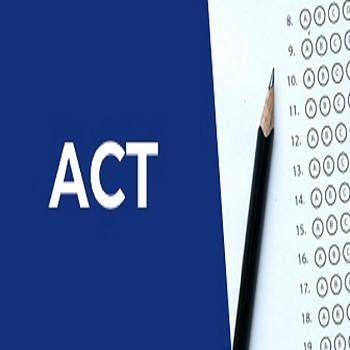ACT Overview:
The ACT is a college entrance exam that many colleges and universities in the United States use as part of the college admissions process. In the ACT, students are assessed in five core areas: English, Math, Reading, Science, and Writing (optional). The validity of ACT scores is five years from the date of testing.
Colleges often use ACT scores for admissions. The reason for this is twofold. It shows how well you’ve prepared for college academically. Additionally, your ACT score will be included in the college’s annual ACT statistics if you are admitted. What are the benefits of increasing your ACT score? Without a doubt. Are you able to improve your ACT score? Without a doubt. The ACT is made up of four sections. These include science, reading comprehension, math, and English.
ACT Exam Format:
The following table gives you a good idea about the flow of the examination on the test day:
| ACT Section | # of Questions | Duration | Syllabus | Question Type |
| English | 75 | 45 minutes | Grammar & usage,/mechanics, and rhetorical skills | Multiple choice |
| Math | 60 | 60 minutes | Algebra, geometry, elementary trigonometry, reasoning, and problem-solving | Multiple choice |
| Reading | 40 | 35 minutes | Reading Comprehension | Multiple choice |
| Science | 40 | 35 minutes | Interpretation, analysis, evaluation, reasoning, and problem-solving | Multiple choice |
| Optional Writing Test | 1 essay prompt | 30 minutes | Writing Skills | Written |
Smart Strategy for ACT preparation:
- Decide the target score goal.
- Take the practice test.
- Find the difference between the Test score and the Targeted score.
- Analyze the practice test.
- Identify the strengths and areas of improvement subject-wise and topic-wise.
- Prepare first high-priority subjects and topics.
- Take practice individual subject tests to check the improvement.
- Take the full-length test before the actual test.
Smart Strategy for the ACT Preparation: Case Study:
- Take a Practice Test: There are a lot of online resources to practice tests or you can go over the Real ACT study guide. Go over all the sample questions and then take the practice test. Solving lots of practice test improve your scores. Math, Science section is more scoring.
- Finding your strong subjects: With the help of practice tests find the vital subject, try to solve more difficult and find out the weak subject, topics and work hard, by solving practice tests and scoring more.
- Setting the ACT targeted composite score: To figure out your ACT target score, look up the score range requirements of colleges.
Usually on an average score range requirements of many colleges
are 34-36.
For example:
Assume, you are targeting 34
And your Baseline ACT Composite Score = 32 as per
the mock-up test.
The score difference between a targeted score and a mock-up
test score.
Difference between ACT Composite Score and Baseline
ACT Composite Score ie. 34-32=02
ACT Exam Strategy to answer the questions:
- Review all the questions first in each section.
- Mark the easy, difficult and unknown questions.
- In the ACT usually, easy questions are preceded by hard questions, answer all the easy questions first.
- Read the hard questions at least a couple of times to make sure you understand the question correctly.
- Manage your time while test-taking, spend a few moments on easy questions, and spend the rest time on hard questions.
- Eliminate the incorrect answers so you can narrow down the correct answer selection.
- All the questions will have only one correct answer.
- There is no penalty for incorrect answers, so Do NOT SKIP the questions and guess the correct answers.
To prepare for the ACT test in a month download the ACT free e-Book. Grade your ACT practice test bubble sheet online to get a detailed Socrato diagnostic report. For test prep strategy, check out the Socrato Youtube channel.










